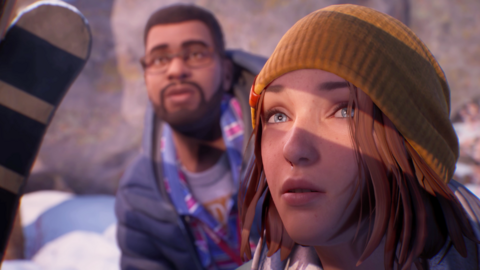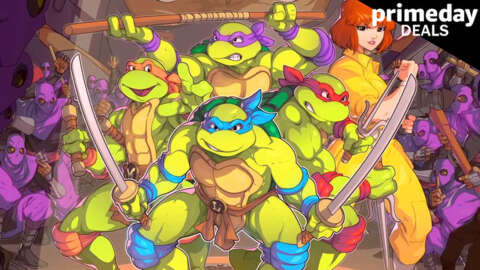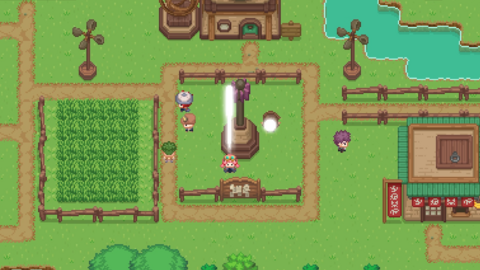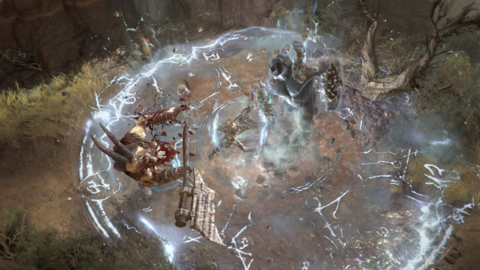Life Is Strange: Double Exposure is launching in just a few short weeks, putting players back into the shoes of the first game’s protagonist, Max Caulfield, on a new adventure that moves her from one US coast to the other. We recently played a 45-minute demo of one of the game’s early chapters that shows off her newfound abilities to move between parallel realities with one major difference: In one world, her friend Safi is alive; in the other, she’s been murdered, and the killer in the first reality may still be at-large, leading Max on an adventure to save her friend before it’s too late.
We also spoke to the game’s creative director, Jonathan Stauder, and narrative director Felice Kuan, about what went into building out this new story for Max, how she ended up in Vermont, and more on the lore surrounding the broader Life is Strange universe. You can read our Q&A with the team below, before the game’s debut on October 29.
Note: This interview has been edited for clarity.
GameSpot: Does Double Exposure declare one ending from the first game canon, and if not, how does that work?
Jonathan Stauder: Oh, no. Nope. So, in the course of starting up the game, playing the first couple of scenes, you will have the opportunity to say what occurred in the first game. From that point forward, you’ve determined your canon.
Okay. I don’t know if it would’ve made sense, but I was thinking, maybe she is shifting between two realities that spawned from the first game’s ending.
JS: Yeah, no. That’s been a [source] of confusion. So just to be clear, the two realities are: Safi’s alive and Safi’s dead. Nothing with Arcadia Bay.
And she’s moved to Vermont, right? What went into that decision? I can understand the idea of, ‘Let’s get her out of the Pacific Northwest,” but why Vermont specifically?
Felice Kuan: I know that we wanted her far away, right? So symbolically, literally on the other side of the country [made sense]. I don’t know if there was any other specific reason. I know that we were excited about winter, because the last game took place around Halloween, so then the next immediate season, you get winter, you get Christmas.
So in a story about alternate realities, how can we be sure this is our Max from the first game? Why don’t we need to worry about that?
JS: Yeah, no, so it’s your Max. Like we were saying, we give you that moment to sort of confirm what happened with that major choice. From that moment forward, you should feel confident as a player, like, “I’m taking the Max I knew from the first game forward into this one and evolving her.”
The plot reminds me of the movie Another Earth. Have you seen it and was that an inspiration? [Both developers confirm they haven’t.] Do you have any other specific inspirations that led you to this story?
FK: From the literary side, the multiverse [concept] is very, very in and very, very prevalent. And so I think we actually wanted–not that we weren’t inspired, and not that we didn’t check out other media–but we wanted very much to find Max’s version of that. [What is her] meaningful intersection with multiverse ideas that Max could go through?
JS: And visually, I’m a huge fan of Remedy games and their own particular brand of weird and how they find their own way to do it, whether it’s alt timelines, multiverses, that sort of thing. And so I think just as a jumping-off point, we’re gonna find our own way to do this particular flavor of time travel across alt universes. I think, especially later in the game, you might see some visual flourishes that feel a little bit [like] Remedy.
This series always uses lots of licensed music. Should fans expect more of that here? Can you speak to specific tracks or artists?
JS: it’ll be a bunch of things that you don’t know yet, because they’re all fresh and new and original for this game. My mandate for the soundtrack and the score was, you want kind of the story of Max and the story of Safi, and how they influence and intertwine and change one another, to echo in the music and the soundtrack. And so, hopefully, you play all five chapters, and you feel that. And I know there’s a lot more about the music coming out before launch, too.
When Max attempts to use her long-dormant powers, she finds they’ve changed since last time.
I’ve seen fan sentiment suggesting bringing Max back is simply fan service. Can you explain why it’s more than that?
FK: I think once you’ve gone through this [game], it’ll be very clear that this is [necessarily] Max’s story. We all found the first game very formative and felt like after a huge choice like the one she has made, there is a ton to unpack. It’s also pretty much the [same] amount of time that has passed since that game’s story, so our own perspectives of what it meant, I think, give us something to say.
JS: Right, so if we’re looking at a list of powers that would be good for these protagonists and we’re looking at this shifting between two distinctly different timelines, I think [we found] that it was a good method for Max to maybe work through all those issues coming out of the first game, and provide catharsis. So we said that, ‘Oh, man, this could be a good Max game.’ We go down that rabbit hole discover, ‘Oh, I think we’re right.’ And then here we are.
Is there anything a Life is Strange game couldn’t do in the first game that you could do now? This could be technical or narrative-related, or something else.
JS: Yeah. I mean, for sure, from a technical perspective. So this is the first Life is Strange game in Unreal Engine 5. So visually, there are a massive number of improvements. You’re gonna see that in all of our performances, the fidelity, the lighting, all those sorts of things […] Like Max’s new power, the shifting, the immediacy of it–where you can pop between two versions of a space without a load screen that sort of thing. That’s certainly something you couldn’t have done, even say back in [2021’s] True Colors.
FK: We love the first game. I think we tried to do everything it does, but more. I think that the first game set a path for having different kinds of characters that you don’t normally see, and being very explicit about topics like teen suicide, things like that [games] just don’t do. And so I think now we’re at a place with however many there have been now, where we can do that and do it even more openly, and have it be baked into the process.
Do all of the Life is Strange games share a single story universe?
JS: Oh yeah, one hundred percent. Everything that Don’t Nod made, everything that Deck Nine has made, that’s all one continuity. But if you go, like, into the comics, into the novels, that is where things start to get a little murky. But for sure, all of the published games to date take place in the same world.
GameSpot: So in one world, all these kids are discovering that they have these powers and they’re potentially like the Avengers of troubled youths. Thematically, you want to express that these kids all discover their powers at their lowest point, is that right? Something traumatic is triggering it each time?
JS: Exactly.
KF: And that means that not every power is a good Life is Strange power because the powers are intimately tied to the specific trauma, and when you find a story background and a power that, like, click, it’s exciting.
Life is Strange: Double Exposure launches on October 29 for PC, PS5, Xbox Series X|S, and Switch. You can preorder it now and receive bonuses such as a steelbook case and other bonuses, both digital and physical, depending on which package you buy.



